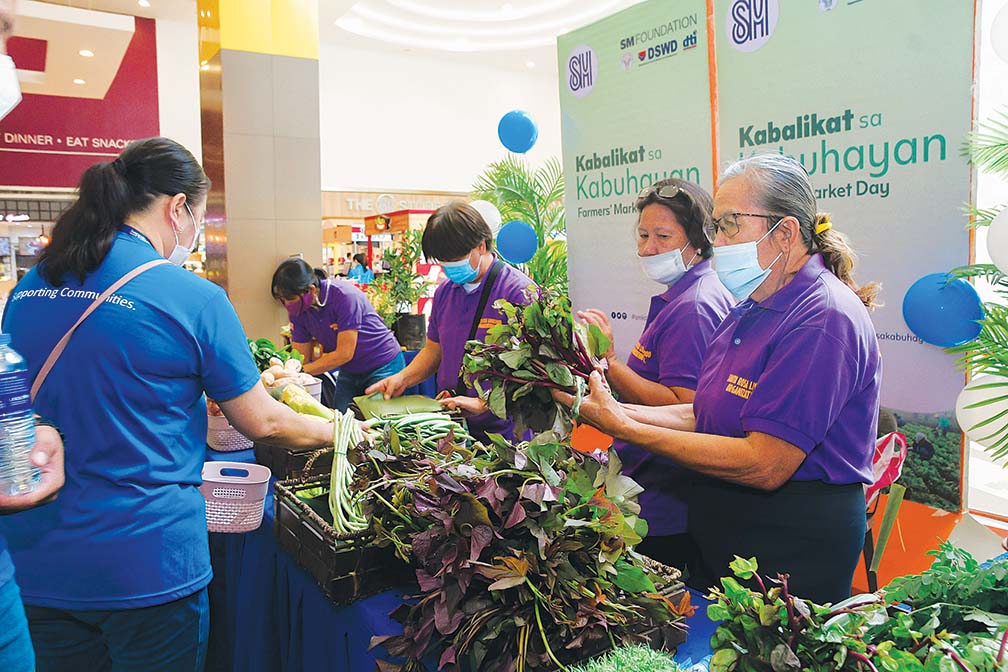SMFI Livelihood & Outreach Programs
It started as a “mall-based” project in 1996. It grew from the expressed wish of people to donate to the many, already on-going projects of SM Foundation, the SM group’s corporate social responsibility arm.
Today, the SMFI Livelihood & Outreach Program focuses on its main thrusts: Kabalikat sa Kabuhayan on Sustainable Agriculture Program (KSK-SAP), Grow Trees Community, and the Operation Tulong Express (OPTE).
The Program is headed by Angeles, with a team composed of Shiela Marie Bahoy, Jennelyn Lizardo, and Arlou Jee Dalisay.
“All projects are annually reviewed and improved to adjust with the changing times and to make it more valuable to both participants and stakeholders,” Angeles said.
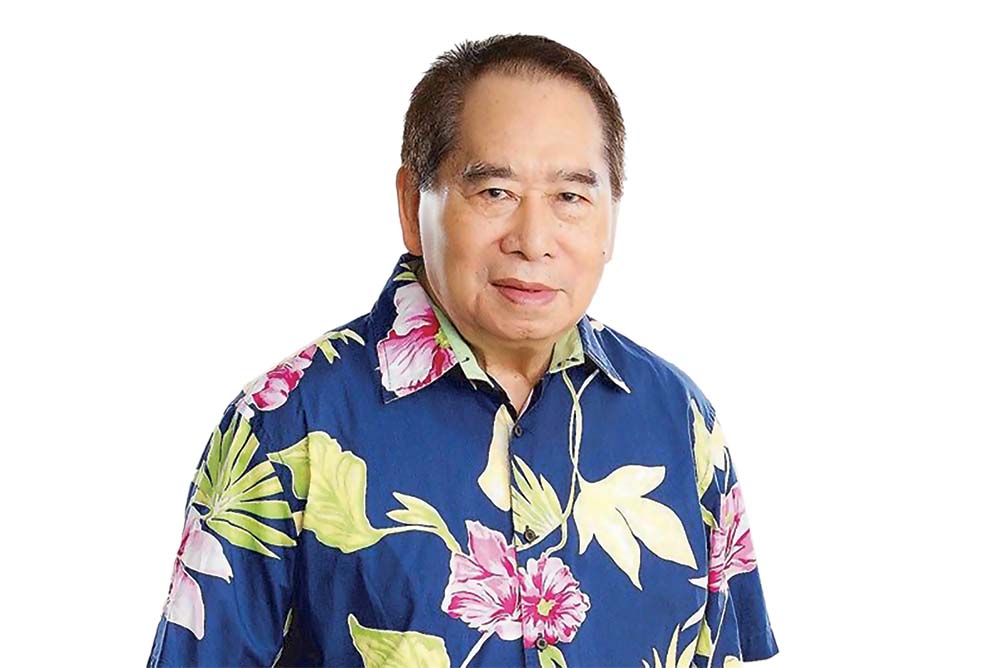
“Many would like to donate but do not know where to bring their donations. That started the quarterly mall-based projects like Wheels of Hope, Gift of Love for the elderly, Share A Toy, Share Your Extras, Donate A Book, and OPTE,” AVP for Livelihood and Outreach Cristina “Cristie” Angeles said.
KABALIKAT SA KABUHAYAN ON SUSTAINABLE AGRICULTURE PROGRAM (KSK-SAP)
In the 2000s, the share of the agricultural sector in the country’s GDP was on the decline, according to the Bureau of Agricultural Statistics (BAS). By 2005, the sector’s contribution was only about 19%.
Low growth in agriculture was ultimately traceable to the slow expansion in the factors of production as well as the weak growth in total factor productivity.
Agriculture was the biggest employer of the economy in the mid-1990s but has since given way to services. Its share in employment had likewise been consistently declining. BAS figures showed that employed persons in agriculture reached 11.63 million in 2005, representing 36% of the country’s total employment. However, real wages of agricultural workers were decreasing.
A significant proportion of agricultural workers lived in poverty conditions. On the whole, the Philippine agricultural sector has been beset with persistent challenges resulting in low farm incomes, low rural employment, lack of food security, and meager agricultural competitiveness. These deprived conditions of Filipino small farmers were what visionary-business mogul Henry Sy, Sr. had moved to address in 2007. In his desire to uplift the lives of the marginalized farmers, the 14-week, science and technology-based, and hands-on training in fruits and vegetables high-value crops through, KSK farmers training program (KSK-FT) field school training, was introduced.
SOCIAL DEVELOPMENT PROGRAM
The Sy patriarch aimed to help uplift farmers from grassroots communities and bring back their hope in farming by updating their agricultural knowledge. Drawing inspiration from Tatang’s mission in 2007, Cristina Angeles took the lead in bringing Kabalikat Sa Kabuhayan on Sustainable Agriculture into existence, fostering a warm and inclusive environment for all involved.
Angeles has cherished memories of Tatang on the time and effort he spent to help in uplifting the lives of Filipino farmers.
“Tatang is a visionary leader, driven by his unwavering commitment to improving the lives of Filipinos. Recognizing the potential of quality products to uplift farmers and meet market standards, Tatang believed in the power of sharing his business principles to inspire farmers to dream big. Through the application of science-based technology, he aimed to enhance the quality of farmers’ produce and empower them for success.”
“Tatang comes to the office earlier than everyone, setting an example for the entire team. He instilled in us the values of empathy and caring for others, recognizing that collective success lies in upholding word of honor, transparency in dealings, discipline, punctuality, and innovation. His profound influence left a lasting impact on the entire organization, fostering a culture of excellence and compassion,” Angeles said.
TRAINING PROCESS AND SOCIAL DEVELOPMENT
The training includes land preparation, seedling selection, plant pest and disease control, organic farming techniques, harvest and post-harvest procedures, and a cost and benefits analysis to decide what crops are to be planted.
The LGU assists in identifying farmers and provides the site and other forms of assistance.
The Department of Agriculture’s High-Value Crops Development Program and Agricultural Training Institute offer technology updates during and after the training. They also supply additional farm inputs to farmers. The DSWD selects and endorses participants from the 4Ps/SLP program, providing social preparation, values formation, business proposal training, and grants for sustainability.
For the training, SM Supermalls imparts Tatang’s values of empathy and care and shares his 14 Business Principles, which include integrity, financial prudence, resilience, and innovation. BDO Foundation, BDO One Net Bank, and the Philippine Institute of Certified Public Accountants provide financial literacy training on basic accounting, the value of savings, and budgeting.
In 2019, SMFI partnered with various government and non-government agencies, including SM Supermalls, SM Markets, DA, DTI, DSWD, TESDA, DOST, DOT, accredited farm schools, and LGUs. This collaboration intends to create an improved program for farmers, addressing their concerns and encouraging new farmers to join. The goal was to promote community food production for food security, develop agripreneurs, advocate for the importance of good agricultural practices, facilitate product development, and provide market exposure and livelihood opportunities. The program, formerly known as KSK-Farmer’s Training, was then transformed into KSK on Sustainable Agriculture.
Moving forward, SM provided training outlines, trainers, facilitators, farm inputs, starter kits, and market opportunities through service providers to the farmers.
TESDA, through its Accredited Schools such as St. Isidore “the Farmer” Learning Center, Castro Tomas Farm School, D’ Planners, Casuga Integrated Farm Schools, Crisel Integrated Farm School, and Moca Family Farm Learning Center, Inc., offered Agricrops Production NCII and Organic Agriculture NCII scholarships to over 1,000 KSK participants nationwide. These certifications provided a sense of pride and enhanced their employability. TESDA also continued to assess participants’ skill requirements to further develop their abilities, acting as mentors to the graduates.
The DA-HVCDP, DA-ATI, DSWD, and LGUs provided ongoing services specific to their departments. The DTI conducted capacity-building activities related to entrepreneurial mindset, pricing, costing, business and licensing assistance, and market opportunities. The DOST focused on science-based product development, laboratory testing, and food safety.
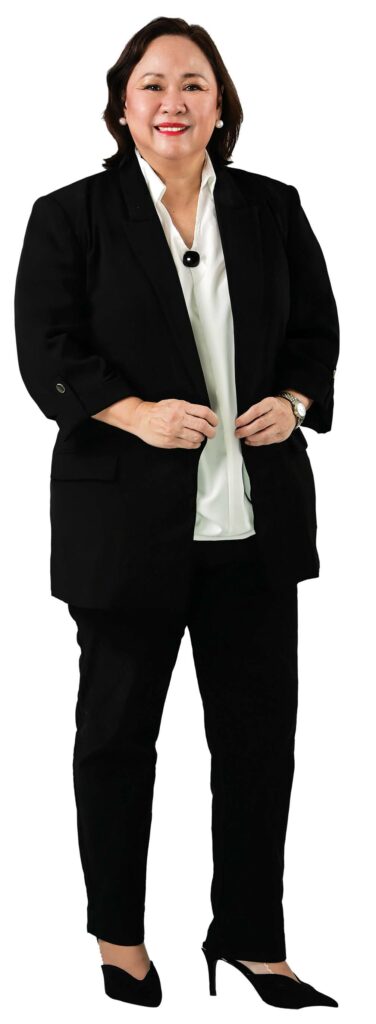
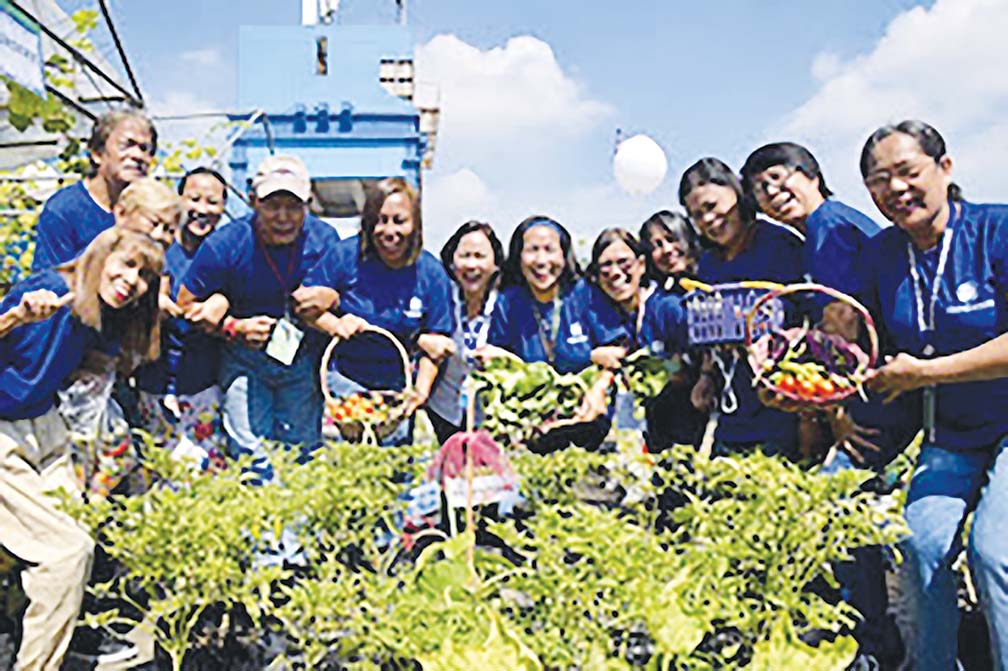
COLLABORATIVE PARTNERSHIP WITH GOVERNMENT AGENCIES
The KSK-SAP also has partner agencies such as DSWD, DA, DTI, TESDA, DOST, DOT, LGU, SM Supermalls, SM Markets, and other NGO’s.
In 2013, SMFI partnered with the DSWD’s Sustainable Livelihood Program and the Pantawid Pamilyang Pilipino Program (4Ps). The DSWD’s twin programs is mandated to support targeted poor households by actively linking them to economic opportunities that will facilitate their transition to self-sufficiency.
SMFI signed a memorandum of agreement with DSWD such that SMFI will allocate 50 KSK Training slots for every batch to 4Ps beneficiaries.
In turn, DSWD will conduct Community-Driven Enterprise Development sessions to all training participants. These sessions involve community members in identifying and managing livelihood opportunities that are linked to sustainable markets.
“We are proud to say that the partnership was able to train 1,000 farmers, where majority of them passed the Organic Agriculture Production NCII or Agricrops NCII,” Angeles said.
SOCIAL ENTREPRENEURSHIP
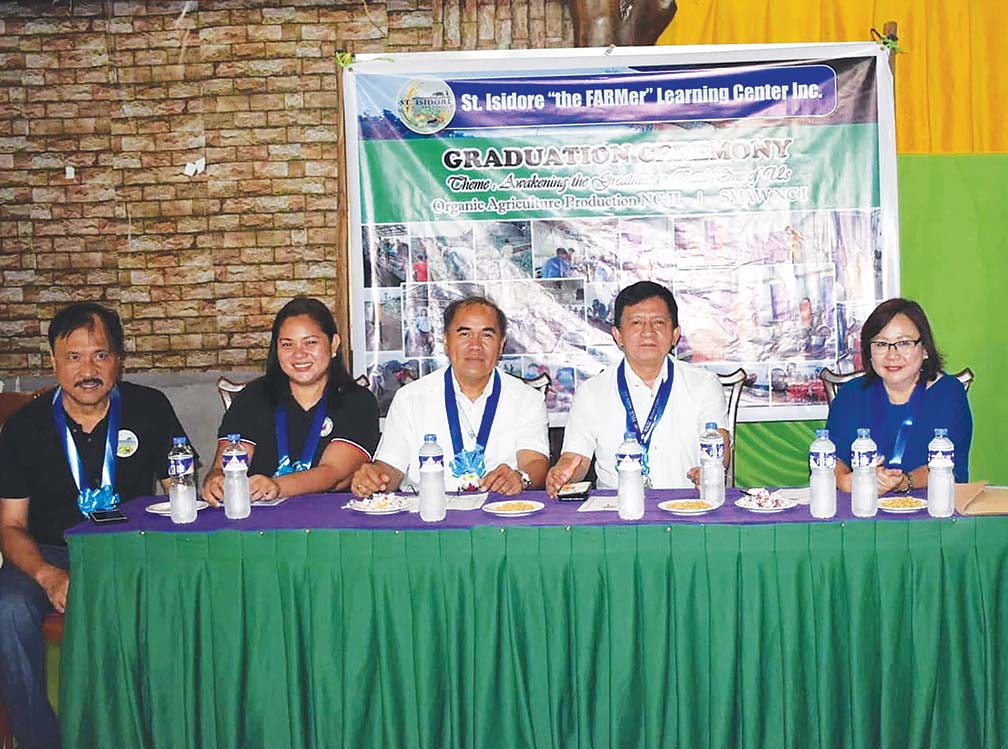
SM Foundation’s KSK-SAP goes beyond providing training to farmers; it also paves the way for market linkages to help ensure sustainable livelihoods. Through partnerships with local markets and SM suppliers, the program assists farmer associations in accessing stable income sources.
As part of the KSK program, farmer-graduates are encouraged to form or join cooperatives, empowering them to establish sustainable social enterprises.
To showcase their products and attract customers, farmers participate in the SM KSK Trade Fair, DA’s KADIWA, DTI’s Trade Fairs, LGU Market Fairs, and other independent fairs. This platform enables farmers to expand their customer base and generate economic opportunities in their communities.
To further the market opportunities of the KSK Farmers, SM Foundation partnered with SMDC for the Good Guys Market and SM Supermalls’ SM Sunday Market, and KSK Farmer’s Market to support farmers in selling their produce. The collaboration facilitated the inclusion of fresh products, such as fruits and vegetables, grains and beans, plants, and flowers. The project focuses on creating a vibrant marketplace that celebrates the best of local agriculture and entrepreneurship and brings together KSK farmers, other local producers, and consumers in a bustling atmosphere.
The success of this market linkage initiative was made possible through the involvement of aforementioned TESDA-accredited farm schools.
“Our partner schools are the farmers’ mentors and big brothers. Aside from helping us in the execution and the design of our training, they also update our farmers in relation to the latest agri-technologies. In addition to this, they assist us in helping our farmers consolidate the farmer’s produce and assist them in selling which is very helpful in uplifting the social enterprises of our farmers,” Angeles explained.
LEARNING SUCCESS
Rogelio Apostol, a KSK-SAP graduate from San Jose Del Monte in Bulacan, shared that he learned about better methods of farming through the program. “We were taught the right way to farm which heightened the quality of our crops.”
“As a farmer, I consider this experience as an additional knowledge for improving my agri-enterprise. This opportunity gave me a chance to assess and plan the marketing of my small agribusiness,” said Emily Santos, a farmer from Sta. Ana, Pampanga.
Farmers who underwent the 12-week KSK-SAP Farmers Training in Negros Occidental were able to harvest a bumper crop of watermelon, lettuce, patola (silk squash), onion, squash, and ampalaya (bitter gourd). In partnership with the DSWD, the participants, who were all part of the 4Ps Program, received additional financial support to form cooperatives.
Iloilo resident Lemie Leonida raised her income after undertaking the 12-week KSK training. She now supplies red lady papaya at the SM City Iloilo Supermarket, as well as in other markets in their area. In a month, Leonida sells an average of 2,000 kilos of papayas, earning PhP50,000. She produces an average of 500 kilos of papaya per week.
This year, SMFI aims to launch the project in around 70 sites nationwide, aiming to reach about 1,000 beneficiaries.
“Tatang’s vision of upgrading the technology by introducing high value crops in a rural setting helped convince traditional farmers that science-based food production is more sustainable and make crops more resilient to climate change,” Angeles said.
She summed up the 17 years that KSK-SAP has become a viable component of SMFI’s Livelihood and Outreach Program: “Today, our farmers have replicated the learnings in their farms and shared their knowledge to neighbors and communities. They have become agritrainors and were given market opportunities by partner agencies. Some are agri-prenuers, some worked abroad, some were able to build their houses, sent childen to colleges, developed process products, among other things. All have had access to networks and has improved their quality of life.”

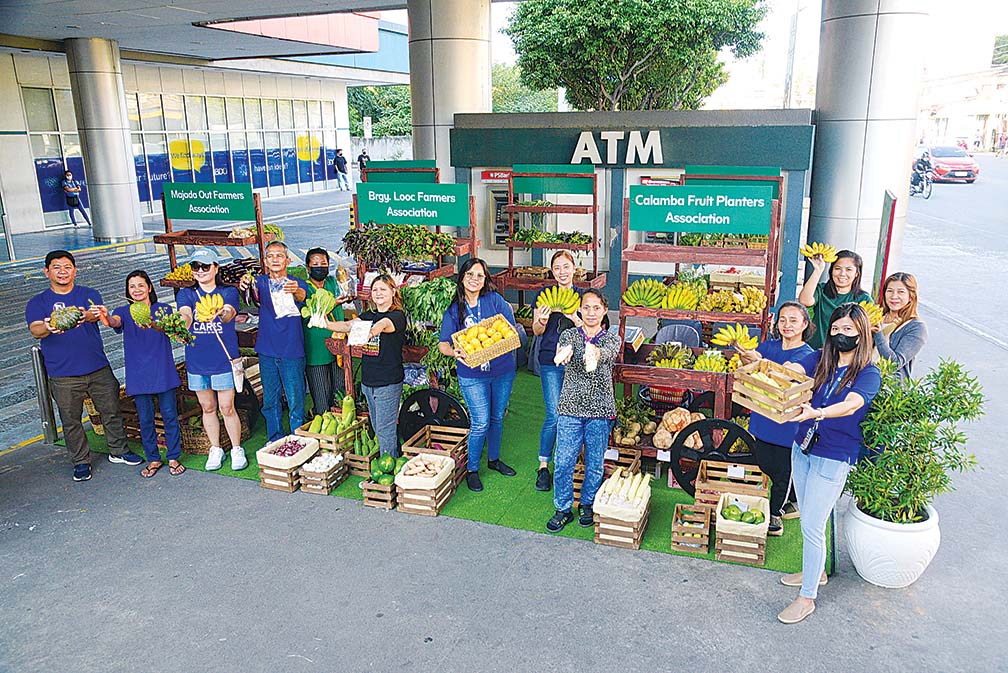
SM SUNDAY MARKET
SM Foundation’s KSK-SAP goes beyond providing training to farmers; it also facilitates market linkages to ensure sustainable livelihoods. Through partnerships with local markets and SM suppliers, the program assists farmer associations in accessing stable income sources.
As part of the KSK program, farmer-graduates are encouraged to form or join cooperatives, empowering them to establish sustainable social enterprises.
To showcase their products and attract customers, farmers participate in the SM KSK Trade Fair, DA’s KADIWA, DTI’s Trade Fairs, LGU Market Fairs, and other independent fairs. This platform enables farmers to expand their customer base and generate economic opportunities in their communities.
To further the market opportunities of the KSK Farmers, SM Foundation partnered with SMDC for the Good Guys Market and SM Supermalls’ SM Sunday Market and KSK Farmer’s Market to support farmers in selling their produce. The collaboration facilitated the inclusion of fresh products, such as fruits and vegetables, grains and beans, plants, and flowers. The project focuses on creating a vibrant marketplace that celebrates the best of local agriculture and entrepreneurship and brings together KSK farmers, other local producers, and consumers in a bustling atmosphere.
The success of this market linkage initiative was made possible through the involvement of aforementioned TESDA-accredited farm schools.
“Our partner schools are the farmers’ mentors and big brothers. Aside from helping us in the execution and the design of our training, they also update our farmers in relation to the latest agri-technologies. In addition to this, they assist us in helping our farmers consolidate the farmer’s produce and assist them in selling which is very helpful in uplifting the social enterprises of our farmers,” Angeles explained.
Over the years, SM Supermalls, SM Markets, The SM Store, and SM Foundation’s Livelihood and Outreach Program have collaborated to spread social good through:
— Wheels of Hope. The campaign was launched in partnership with Department of Social Welfare and Development (DSWD) and the National Council for the Welfare of the Disabled persons. Aimed at encouraging Person with Disabilities (PWDs) to be part of the mainstream, it provided wheelchairs to more than 500 wheelchair-bound persons with disability;
— Share Your Extras. In partnership with The SM Store, SM Supermalls, and DSWD, this first quarter, mall-based project encourages customers to share their pre-loved clothes, which were distributed to marginalized communities in DSWD’s CIDSS areas.
— Donate A Book. A nationwide back-to-school book campaign that solicits used books from private schools and new books from publishers, for donation to public schools. The project helped marginalized students, especially those in the far flung areas, with their researches and school subject information updates. This is now being handled by SM Store;
— Share A Toy & Bears of Joy. Christmas season activities that bring Christmas cheer to children in hospitals, community, and children’s centers and institutions;
— Kabalikat sa Kabuhayan Trade Fair. Held in partnership with the Cooperative Development Authority (CDA), DSWD, DTI, DOLE, and non-government institutions like Peace and Equity Foundation, Philippine Business for Social. Progress (PBSP), among others. The Trade Fair encompassed all projects that provided livelihood opportunities for the marginalized, gathering all beneficiaries that produced Filipino-made products for exhibition in selected SM Malls nationwide. Some of the trade participants are now selling in SM Markets and Kultura, while others are into export.
— Jobs Skills and Livelihood Trade Fair for Persons with Disabilities Caravan. An employment-and livelihood opportunity caravan held in partnership with the National Council for the Welfare of the Disabled Persons, Department of Labor and Employment (DOLE), DSWD, Department of Trade and Industry (DTI), and SM Supermalls. Through social exposure and by showcasing their skills, talents, and PWD-made products, the caravan helped encourage companies to hire qualified PWDs and help them develop their entrepreneurial skills.
— SM Foundation’s environmental initiatives, “Grow a Million Trees” and “Grow Trees Community,” are at the forefront of driving a greener and more sustainable future. These programs are dedicated to combating deforestation, fostering environmental stewardship, and taking decisive action against climate change. The “Grow Trees Community” project, launched last year, is a five-year community and environmental development endeavor carried out in collaboration with Fast Retailing Foundation. This innovative partnership aims to empower local communities and facilitate their active participation in environmental conservation efforts.
— Gamot Para sa Kapwa. In a joint effort, SM Foundation and SM Supermalls have come together to launch “Gamot para sa Kapwa”—a transformative initiative that aims to provide essential healthcare and medicines to those in need. This powerful partnership combines the resources and reach of SM Supermalls with the unwavering commitment of SM Foundation to create a lasting impact on the well-being of communities. The program evolved and was adopted by the SMFI Health and Wellness Program.
Operation Tulong Express
“As a company that has been committed to social good since it was founded, it is part of SMFI’s vision to engage our employees through volunteeriSM. Regardless of their location or role, our volunteers are all about giving back—spreading social good in the communities where they personally live and work. We thank our employees and partners for collaborating with us in aiding those who were affected by the typhoon. Through our collaborative efforts, we will be able to help our countrymen rise above any crisis.”—Debbie Pe Sy, Executive Director, SMFI
over the years, the SM Foundation and SM Supermalls have established a system where goods are already in place once disaster strikes. The Manual of Operations are cascaded to the malls, for reference on how to implement Operation Tulong Express (OPTE).
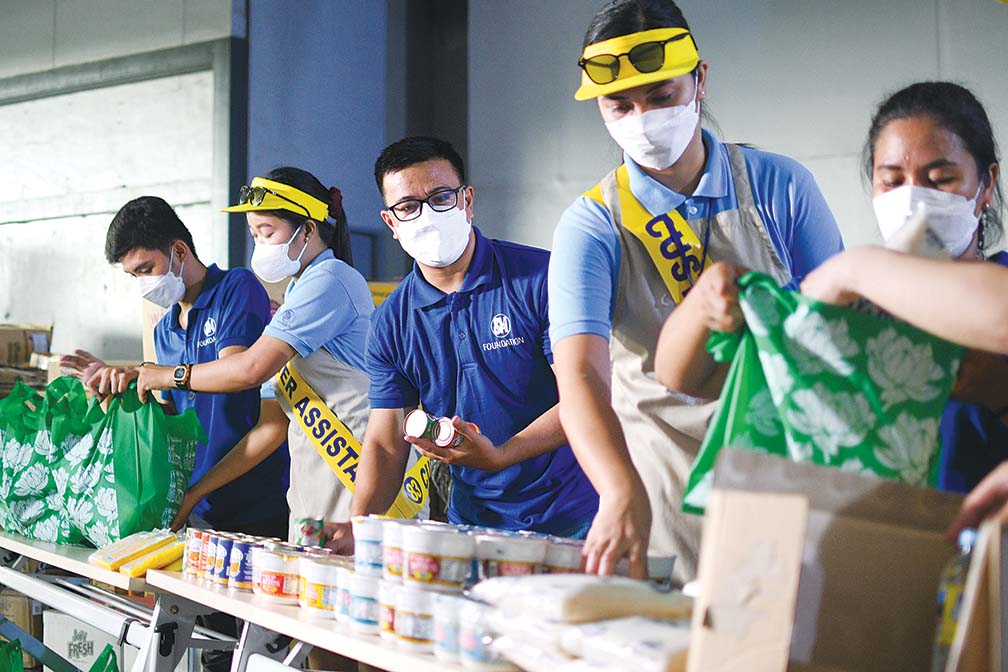

Launched in August 2012, OPTE distributes relief items or Kalinga Packs to various barangays and communities severely affected by typhoons, monsoon rains, and flooding at a given time.
As stated in the World Bank Climate Change Portal, the Philippines is highly prone to natural disasters, with 60% of its land area exposed to typhoons, floods, landslides, droughts, earth- quakes, and even tsunamis.
In the month that OPTE was launched, the northern part of the country was hit by Typhoon Helen (international name: Typhoon Kai-Tak), triggering flash floods and landslides that affected more than 3,000 people. Around 20 northern provinces were severely affected by the tropical cyclone, including Pangasinan, Ilocos Norte, and La Union.
OPTE served more than 140,000 families in the Visayas region. Priority was given to severely hit areas like Cebu City in Cebu province, Panay Island, Tacloban City, Ormoc, Samar, and Bacolod City.
Yolanda was responsible for more than 6,000 deaths and damage that amounted to US$2.2 billion (approximately PhP95.5 billion). It is universally regarded as the deadliest and most expensive typhoon in the country’s recent history.
In the wake of Yolanda, SMFI’s OPTE distributed a total of 50,000 relief packs to the different municipalities and provinces in the Visayas region. Priority was given to severely hit areas like Cebu City in Cebu province, Panay Island, Tacloban City, Ormoc, Samar, and Bacolod City.
Employees of SM Investments Corporation (SMIC) and SM subsidiaries raised over PhP1 million in cash donations to support rehabilitation projects for Yolanda victims.
“We are very grateful to our SM employees for this donation; for sharing not just their hard-earned money but for also generously giving their time as volunteers in providing comfort and attention to our countrymen affected by typhoon Yolanda. This is indeed an affirmation of people helping people and through our joint efforts, we hope to continue responding and alleviating the lives of those who need us the most,” said Cristina S. Angeles, Assistant Vice President for SMFI Livelihood and Outreach Program.
QUICK RESPONSE
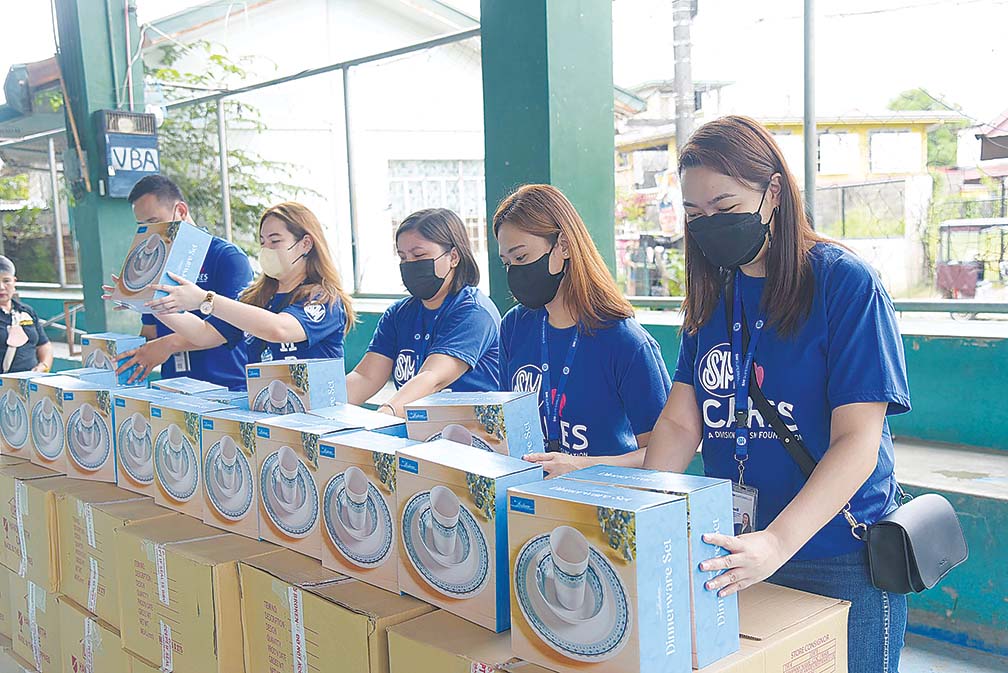
SM Foundation’s Operation Tulong Express (OPTE) serves as the organization’s quick response system, providing swift aid to individuals af- fected by natural calamities and disasters. Through OPTE, immediate assistance in the form of medicine and essential supplies is extended to those in need, ensuring their basic needs are met during challenging times.
SM Foundation’s Operation Tulong Express (OPTE) leverages SM malls as central hubs for collecting donations from customers and tenants, which are then channeled through SM Foundation. Multiple drop-off points are established within the malls, enabling people to contribute donations in cash or in kind. With a strong connection to the local community, each SM Supermall promptly collaborates with the local government unit to identify areas and evacuation centers in need of assistance.
Under the leadership of SM Foundation, relief operations are efficiently executed in coordination with SM Supermarket, Savemore, and Hypermarket. These operations involve the distribution of “kalinga” (relief) packs, comprising mineral water, rice, ready-to-eat meals, and instant noodles. The implementation of OPTE also facilitates collaboration with other bene-factors, such as Uniqlo Philippines and SM Store, who contribute donations directly to the intended beneficiaries.
Through the SMFI Livelihood and Outreach Program, OPTE acts as a vital conduit, ensuring efficient and effective support reaches those affected by disasters and calamities.
To date, some 600 OPTE have been conducted, with 800,000 Kalinga Packs distributed.

